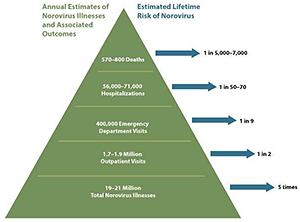Burden of Norovirus Illness and Outbreaks
Norovirus is the leading cause of acute gastroenteritis in all age groups in the United States.

Figure: Burden of Norovirus in the United States Estimates of the annual number of illnesses and associated outcomes for norovirus disease in the U.S., across all age groups. Lifetime risks of disease are based on a life expectancy of 79 years of age. Enlarged view.
Ranges represent point estimates from different studies, not uncertainty bounds.
Each year on average, norovirus—
- causes 19-21 million cases of acute gastroenteritis, and
- contributes to 56,000-71,000 hospitalizations and 570-800 deaths, mostly among young children and older adults
Across all ages, 16% of all acute gastroenteritis in the community is caused by norovirus, and 12% of acute gastroenteritis cases that get outpatient care are caused by norovirus.
People can get norovirus illness at any time during the year. But, it is most common in the winter. Also, there can be 50% more norovirus illness in years when there is a new strain of the virus going around.
Norovirus is the leading cause of severe acute gastroenteritis among U.S. children less than 5 years of age who seek medical care.
- Norovirus is responsible for nearly 1 million pediatric medical care visits annually.
- By 5 years of age, an estimated 1 in 278 children will be hospitalized; 1 in 14 will visit an emergency room, and 1 in 6 will receive outpatient care for norovirus illnesses.
Norovirus is the leading cause of foodborne illness in the United States. It is responsible for—
- 58% of domestically-acquired foodborne illnesses, and
- about 50% of foodborne disease outbreaks due to known agents.
Each year, it costs about $2 billion in the United States for healthcare and lost productivity from foodborne illness caused by norovirus.
Norovirus is the leading cause of illness and outbreaks from contaminated food in the United States.
 Most of these outbreaks occur in the food service settings like restaurants. Infected food workers are frequently the source of the outbreaks, often by touching ready-to-eat foods, such as raw fruits and vegetables, with their bare hands before serving them. However, any food served raw or handled after being cooked can get contaminated with norovirus.
Most of these outbreaks occur in the food service settings like restaurants. Infected food workers are frequently the source of the outbreaks, often by touching ready-to-eat foods, such as raw fruits and vegetables, with their bare hands before serving them. However, any food served raw or handled after being cooked can get contaminated with norovirus.
Norovirus outbreaks can also occur from foods, such as oysters, fruits, and vegetables, that are contaminated at their source.
Waterborne outbreaks of norovirus illness also occur in community settings. This is often caused by sewage contaminated wells and untreated recreational water.
For more information about the foodborne burden of norovirus illness, see the CDC Estimates of Foodborne Illness in the United States.
How Norovirus Spreads
Norovirus is highly contagious. It spreads through—
- close person to person contact
- contaminated food or water
- contaminated surfaces, objects, or substances
It can also spread through aerosolized vomit that lands on surfaces or enters a person’s mouth then he or she swallows it. more
- Page last reviewed: June 24, 2016
- Page last updated: July 10, 2017
- Content source:


 ShareCompartir
ShareCompartir